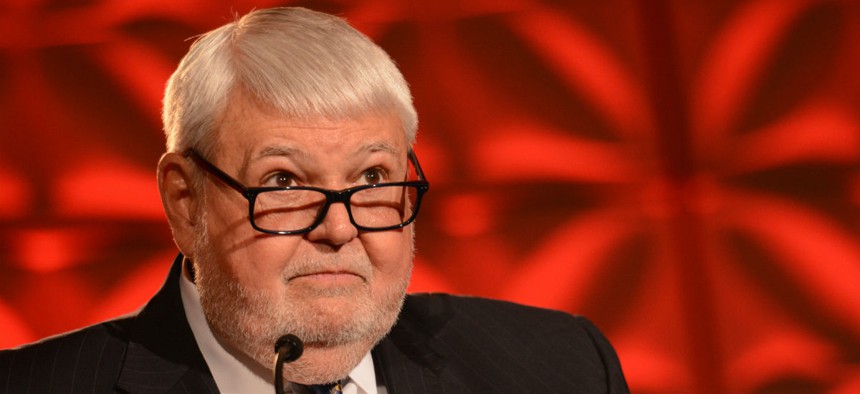
AFGE President J. David Cox Sr. said: "Tough times never last, but tough people always do, and AFGE is a tough union.” Flickr user AFGE
Here’s How One Federal Employee Union Will Fight Back Against Trump
Leader acknowledges many battles ahead but says the president-elect does not represent an existential threat.
If the message of J. David Cox, the president of the largest federal employee union, could be summed up as succinctly as possible, it would be: Don’t panic.
The American Federation of Government Employees leader is taking a measured approach in preparing for the Trump administration, declining to sound the alarms that many Hillary Clinton supporters have in the weeks since the election. Self-described as a man who has “never seen a half-empty glass of water,” Cox told reporters Wednesday he does not expect any new challenge his union hasn't faced time and time again in its 80-year history.
“We’ve been here and done this over and over,” Cox said. He noted while there is always some apprehension during a presidential transition, “I’ve been on this merry-go-round before. This union has been on this merry-go-round before.”
He expressed skepticism Trump would follow through with his promise to institute a hiring freeze on his first day in office. Even if he does, Cox predicted, the outcry from the American public waiting longer to receive government services would force Trump’s hand to shift the policy quickly.
AFGE, like most federal employee unions, endorsed Clinton for president, and mobilized its members across the country to help her defeat Trump.
“She did not win,” Cox said. “The country will go on.”
The union president said he expects some “aches and pains,” but that federal employees would likely be “nibbled at” by the Republican-controlled Congress and White House rather than “gigantic wholesale change.” Part of his optimism stemmed from his claim for bipartisan support on federal employee issues. AFGE endorsed 51 Republican members of Congress in the 2016 election, and Cox said he will now call on those members to fight against any anti-union, anti-worker or anti-agency proposals that arise. Many of those Republicans have large swaths of federal employees in their districts, he explained, and it is “hard to vote against your constituents.”
AFGE expects to fight attempts to strip federal employees of defined-benefit pensions, limits on union “official time,” stripping feds’ due process rights, shifting toward a pay-for-performance personnel system and preventing agencies from automatically deducting union dues from paychecks. Cox said he is made most nervous by Trump’s “unpredictability,” but certain parts of his message -- such as defending Social Security and Medicare benefits -- illustrate ways the union and White House could work together.
Cox said he would like to tell the future head of the executive branch, “President Trump: Stand up for your workers like you stood up for Carrier workers.” Cox was referencing a recent deal Trump announced with the private sector company to prevent some of the jobs it had planned to ship to Mexico from leaving Indiana in exchange for tax relief.
In the more immediate term, Cox said he expects agencies to struggle through April, as Congress is expected to pass a continuing resolution to keep government open until that time. Business expenses have grown, making it harder for agencies to carry out their missions at 2016 spending levels, he said. He called President Obama’s 1.6 percent pay raise for 2017 a “done deal,” and predicted a significantly larger increase in 2018. The union is already working with members on both sides of the aisle to introduce a bill in the next Congress to give federal workers a larger raise than the 1.9 percent likely to come from the pay formula.
AFGE has not heard from Trump himself, but some of its staff has had conversations with “lower-level” people on the president-elect’s transition team. Those discussions have focused primarily on carrying out the Federal Labor Relations Act, as well as talks with Trump’s Office of Personnel Management landing team. Cox said he expects labor-management councils to continue, as they did at many agencies in the Bush administration in spite of an executive order dissolving them.
“Divorce is never an option in the labor-management arena,” Cox said.
Cox, ever the optimist despite all the potential areas for conflict, said he thinks Trump could become a champion for federal workers.
“What gives me hope,” he said, “is we’ve seen him stand down Republican leadership on issues that are important to working people.”
And if Trump decides to go another route, AFGE is prepared. It will mobilize its members, call on friendly Republicans and lean on the American public’s demand for prompt and efficient delivery of government service. After all, Cox defiantly noted, his organization has “flourished and grown” through worse.
“Are these tough times?” Cox asked. “Yeah. Tough times never last, but tough people always do, and AFGE is a tough union.”







